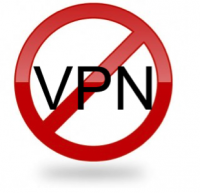
Lately VPNs or Virtual Private Networks have been highly demanded in several countries around the world as there has been a wide spread of government online censorship, government online surveillance, cyber crimes, and several other online issues and risks. Until recently VPNs was the best answer for all these issues as they allowed users to bypass any online restrictions and at the same time protect the users’ online security and privacy. Until this moment, everything was going fine.
Lately governments and ISP’s have been taking actions to try and block VPNs under the reason of these services being used to undergo illegal online activities. We have seen this in several countries around the world and mostly in China and Russia. While internet users started to get very concerned from these movements, there is still a very simple way to bypass any attempts to block VPNs. Before we go through the pointers on how to avoid a VPN block, we need to understand briefly how VPNs work to protect their users’ online freedom, online security, and online privacy. Now most of the features provided by a VPN serve all three aspects (online freedom, privacy, and security) in an interrelated manner. However, some features are more specialized in a certain purpose than others.
Online Freedom
A VPN service provider usually operates a network of servers placed all over the world. In order for VPN users to bypass any online censorship in their country, all they need to do is choose to connect to any of the VPN servers that are located outside of the country and this will redirect all their internet traffic to that server, hence bypassing the restriction. Another feature related to online freedom is that VPNs support tunneling protocols that are used to bypass strong firewalls placed by governments used to block different types of internet content.
Online Privacy
Once a connection is established between the VPN user and the VPN server, the server replaces the user’s true IP address with one of its shared IP addresses to hide the user’s true online identity. In addition to that, most reliable VPNs use a high level encryption to secure all the data being transmitted throughout their network, making it impossible for any unwanted parties, trying to snoop around, to view this information. Last but not least, most of the high-end VPN providers have very strict zero logs policies which means they do not record or keep logs of their users’ online activities or browsing history. All these features ensure the VPN users’ complete online privacy.
Online Security
Most of the feature of a VPN related to online security are those related to online privacy which include the encryption used to secure the network and the tunneling protocols. When it comes to online security, we need to look closer at a very important feature which is the security protocols supported by the VPN provider. The protocols used by most VPN providers are very common and we will discuss them in details later on. To provide more security, different VPN providers offer their users with different additional security features. These features differ from one VPN to another.
Now that we understand how VPNs generally work we can discuss the few simple pointers on how we can bypass any attempts made to block these VPNs.
How to Avoid a VPN Block
The Bigger the Better
As we have discussed earlier, the main purpose of a VPN is to unblock censorship or bypass censorship through connecting the users to one of its servers outside of the restriction zone. This means that the more options of servers the better. In other words, the larger the network of servers that is operated by the VPN provider, the less chances there will be in blocking these servers and also the larger the variety of servers located in countries with no intentions of placing a block on VPNs..
Stay Safe
We have mentioned above that VPNs provide online security through encryptions and security protocols. We also mentioned that the security protocols provided by most VPNs are pretty common which include PPTP, L2TP/IPSec, SSTP, IKEv2, and OpenVPN. These are the most common protocols used and they are placed in the order from least secure to most secure. This means that when choosing a suitable VPN that cannot be easily blocked, users most make sure that it supports the most secure protocols and try to avoid those that support PPTP.
A slight complication might appear at this point is that in any VPN, not all servers support all protocols. This is why, when choosing a VPN, it is very important to view their full list of servers and which protocols are supported by which servers and then choose the VPN with the closest servers to the country with the restrictions, and at the same time support the most secure protocols. This is to ensure a secure and fast connection, and at the same time lower the risk of that VPN being blocked anytime soon. This will require a little research from the users’ end.
Some VPN providers also support their very own and unique stealth protocols to further secure the connection. It is always better to have a larger variety of secure protocols to choose from.
What Cannot be Seen Cannot be Blocked
It is extremely hard to block a VPN service that supports SSTP (Secure Socket Tunneling Protocol) as this protocol disguises itself as normal network traffic, even uses the same ports, so blocking it would be almost impossible without blocking all internet access.
The disadvantage of the SSTP is that it can slow down the connection and also not all VPN providers support it and even the ones that do only support it on a few of their servers. This means that users might have to connect to a server at a further distance to be able to use an SSTP supported connection. This is why it is important for users to focus on a VPN provider that supports SSTP on a close enough server as to lower the impact of slowing down the internet connection.
Location Counts
There are VPNs with headquarters all over the world. Now if the user chooses a VPN that has its headquarters located in a risky location like China or Russia, then there is a huge chance that this VPN will be easily blocked by the government. On the other hand, choosing a VPN with its headquarters located in a country that supports online freedom, security and privacy, then even if the country of the user blocks the server located in that country, it won’t have the jurisdiction to block the entire VPN service, and so the user can simply just connect to a server outside of the country. The more free countries, when it comes to the internet and VPNs in specific, include Switzerland, Iceland, Sweden, Finland, Netherlands, and several others. There is a large variety of VPN providers that have their headquarters in these locations. With a little intense researching they will be found. This is probably the most important point to look for when searching for a VPN that it not under the risk of having a block being put on its operations.
Conclusion
We cannot bypass a block already placed on a VPN, however we can choose a VPN that has a very low chance of being blocked by focusing on its security features and where its located. These 2 main points can give the users a slight idea about whether a VPN is under the risk of being banned or a country putting a block on its operations. In other words, the user has to do an intensive research among VPNs. First focus on the location of the headquarters of the VPN provider then focus on the size of the network of servers operated by the VPN. Last but not least focus on the security features and especially the security protocols and which servers support which protocols. This is how a user can choose a VPN that is not under the risk of being blocked or avoid a VPN block.


